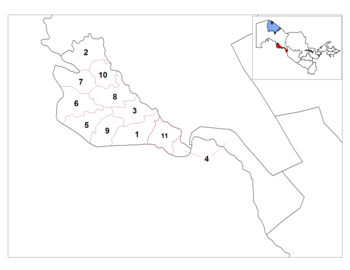Khorazm Region
Xorazm Viloyati
Xorazm viloyati | |
|---|---|
| Khorezm Region | |
 | |
 Khorazm in Uzbekistan | |
| Coordinates: 41°20′N 61°0′E / 41.333°N 61.000°E | |
| Country | Uzbekistan |
| Established | 1938 |
| Capital | Urgench |
| Government | |
| • Hokim | Jo'rabek Raximov |
| Area | |
• Total | 6,050 km2 (2,340 sq mi) |
| Elevation | 98 m (322 ft) |
| Population (2023) | |
• Total | 1 958 200 |
| Time zone | UTC+5 (East) |
| Area code | +998 |
| ISO 3166 code | UZ-XO |
| Districts | 11 |
| Cities | 3 |
| Towns | 56 |
| Villages | 550 |
| Website | www |
Khorazm Region, also known as the Khorezm or Xorazm Region, (Uzbek: Xorazm viloyati, Хоразм вилояти, خوارزم ولایتی) is a viloyat (region) of Uzbekistan located in the northwest of the country in the lower reaches of the Amu Darya River. It borders with Turkmenistan, Karakalpakstan, and the Bukhara Region. It covers an area of 6,050 square kilometres (2,340 sq mi).[1] The population is estimated at 1,959,300 (2023), with 67% living in rural areas.[2] The capital is Urgench (pop. est. 147 300). Other major towns include Xonqa, Khiva, Shovot, and Pitnak.

The climate is a typically arid continental climate, with cold winters and extremely hot, dry summers.
The city of Khiva in Khorezm Region is a UNESCO World Heritage Site with world-famous architectural monuments, making Khiva one of the main centers for international tourism in the country.

The economy of Khorezm Region is primarily based on cotton. Cotton is by far the main crop, although rice production has increased significantly in the last several years. (though the Uzbek government discourages rice production near to deserts, over water usage concerns) There are also many orchards and vineyards, melon and gourd plantations and potato fields. Khorezm Region is famous for its "gurvak" melon in Uzbekistan. Industry is also heavily oriented to cotton, with cotton refining, cottonseed oil extraction and textiles predominating. Khorezm is a place where many famous scholars were born, such as Abu Rayhan Biruni and al-Khwārizmī. The region has a well-developed transportation infrastructure, with over 130 km of railways and 2000 km of surfaced roads. The region is connected by rail to European Russia and the Caucasus. People in Khorezm speak in Khorezmian, which is an Oghuz dialect of Turkic Languages that is different from Karluk (in which most of other Uzbek regions' people speak)
Administrative divisions
[edit]
The Region consists of 11 districts (listed below) and two district-level cities: Urgench and Khiva.[1][3]
| Key | District name | District capital |
|---|---|---|
| 1 | Bogʻot District | Bogʻot |
| 2 | Gurlan District | Gurlan |
| 3 | Xonqa District | Xonqa |
| 4 | Tuproqqal'a District | Pitnak |
| 5 | Khiva District | Khiva |
| 6 | Qoʻshkoʻpir District | Qoʻshkoʻpir |
| 7 | Shovot District | Shovot |
| 8 | Urganch District | Qorovul |
| 9 | Yangiariq District | Yangiariq |
| 10 | Yangibozor District | Yangibozor |
| 11 | Hazorasp District | Hazorasp |
There are 3 cities (Urgench, Khiva, Pitnak) and 56 urban-type settlements in the Khorazm Region.[1][3] In March 2020 the new Tuproqqalʼa District was created out of the larger, eastern part of Hazorasp District.[4] Gurlen is one of the most unique districts in the region.
The most interesting place in Khorezm is Aqdarband village. Ancestors of the people of Aqdarband came from Iran in 15th age to protect Khiva.
See also
[edit]References
[edit]- ^ a b c "Oʻzbekiston Respublikasining maʼmuriy-hududiy boʻlinishi" [Administrative-territorial division of the Republic of Uzbekistan] (in Uzbek). The State Committee of the Republic of Uzbekistan on statistics. July 2021. Archived from the original on 4 February 2022.
- ^ "Viloyat bo'yicha shahar va qishloq aholisi soni" [Urban and rural population in the region] (PDF) (in Uzbek). Xorazm regional department of statistics.
- ^ a b "Classification system of territorial units of the Republic of Uzbekistan" (in Uzbek and Russian). The State Committee of the Republic of Uzbekistan on statistics. July 2020.
- ^ Decree 23 March 2020, 184-IV, LexUZ.

